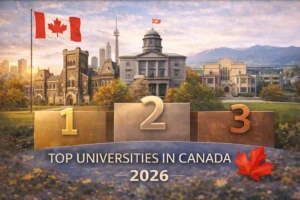Guide to Studying in the UK

If you dream of studying at a prestigious university, the United Kingdom could be the perfect choice for you. Many UK universities are ranked among the best in the world. The capital, London, is known as the global hub of higher education, with four of its universities listed among the world’s top institutions. To study in the UK, you need to meet specific requirements to obtain a student visa.
Education System in the UK
In the UK, all children aged 5 to 16 are required to attend school. Students must begin their education from early years and continue through secondary school. However, Further Education (FE) and Higher Education (HE) are not mandatory. The UK education system is generally divided into five key stages:
Early Education
Primary Education
Secondary Education
Further Education (FE)
Higher Education (HE)
Requirements for Studying in the UK
To immigrate for educational purposes, there are several key factors such as academic qualifications, English language proficiency, and financial means, all of which are explained below.
Age Requirements for Studying in the UK
All students aged 16 and above can study at UK colleges and universities. Students aged 16–18 can enroll in Further Education (FE) programs, and those 18 or older can attend universities in the UK for Higher Education (HE) degrees.
💡 Note: If you are between 16 and 17 years old and intend to study at an independent school in the UK, you must apply for a Child Student Visa.
💡 Note: There is no maximum age limit to obtain a UK student visa. Individuals of any age can apply to study in UK colleges and universities, provided they meet all other requirements.
English Language Requirements for Studying in the UK
To study in the UK, you must demonstrate English proficiency through one of the following methods:
Passing a Secure English Language Test (SELT) approved by UK authorities.
Holding a GCSE at grade A, or a Scottish National Qualification at level 4, 5, or Advanced Higher in English—completed before the age of 18 and awarded by a UK school.
Holding a university-level degree taught in English. If you studied outside the UK, you must verify the equivalency of your degree to a UK bachelor’s, master’s, or PhD through Ecctis (formerly UK NARIC).
Accepted SELT exams for the UK:
✔ IELTS Academic: One of the most widely recognized English tests globally, accepted by most UK universities and institutions.
✔ PTE Academic: A reliable test evaluating reading, writing, speaking, and listening skills, accepted by many UK universities.
✔ PSI Services (UK) Ltd – Skills for English (UKVI): Specifically designed for UK student visa applicants.
✔ LangCert: Another trusted exam for assessing English language skills, recognized by various UK educational institutions.
Financial Requirements for Studying in the UK
As an international student applying for a UK student visa, you must prove to the UK government that you can cover your tuition and living expenses. Required financial proof is as follows:
✔ For studying in London: £12,006
✔ For studying outside London: £9,207
Academic Requirements for Studying in the UK
Each academic level has its own prerequisite qualifications:
Undergraduate (Bachelor’s) programs: High school diploma or equivalent
Postgraduate (Master’s) programs: Valid bachelor’s degree plus relevant coursework or work experience
Doctoral (PhD) programs: Valid master’s degree plus related coursework or experience
💡 Note: All academic documents must be translated into English and include official transcripts.
Credential Evaluation for Studying in the UK
Credential recognition for studying in the UK is straightforward. You only need to translate and officially certify your academic documents, then upload them to the UK National Information Centre (naric.org.uk). After 1 to 2 months, your documents will be assessed, and you will receive a confirmation. This service is completely free of charge.
GPA Requirements for Studying in the UK
✔ Undergraduate (Bachelor’s): GPA equivalent to 14/20 or higher
✔ Postgraduate (Master’s & PhD): GPA equivalent to 15/20 or higher
The table below shows how Iranian GPAs convert to the UK GPA system:
| Iranian GPA | Equivalent GPA | Grade | UK Degree Classification | UK Class Ranking |
|---|---|---|---|---|
| 18–20 | 4.0 | Grade A | 70% and above | First-Class Honours (1st) |
| 15–17 | 3.3–3.9 | Grade B | 60–69% | Upper Second-Class Honours (2:1) |
| 12–14 | 2.7–3.2 | Grade C | 50–59% | Lower Second-Class Honours (2:2) |
| 10–11 | 2.0–2.6 | Grade D | 40–49% | Third-Class Honours |
| Below 10 | 0–2.0 | Grade F | 0–39% | Fail |
Studying at Universities in the UK
To study at UK universities, students must enroll in higher education programs. Higher education in the UK includes studying at reputable colleges and universities at the undergraduate and postgraduate levels, including master’s and PhD degrees. Program durations are typically 3–4 years for a bachelor’s degree, 1–2 years for a master’s, and 3–4 years for a PhD.
Once you sign the performance agreement and pay the $75,000 deposit, the Department of Industry, Tourism, and Investment will issue you a support letter. With this letter, you are allowed to submit your application for a temporary work visa to the Canadian federal immigration office, IRCC.
If you receive a work permit, you can enter Canada and start setting up your business there.
Undergraduate Studies in the UK
Undergraduate programs in the UK usually last 3 years for international students. Some degrees, such as engineering, may take up to 4 years. Types of undergraduate degrees include:
Standard Undergraduate Degree: 3–4 years of study in a chosen subject at an accredited university.
Joint or Dual-Honours Degree: Combines two fields of study for greater flexibility and career options.
Sandwich Course: A 4-year program that includes a 1-year work placement.
Master’s Degrees in the UK
Most master’s degrees take one year full-time or two years part-time. Popular fields of study include:
Artificial Intelligence
Sustainability
Laboratory Research
Business Management
Master’s degree types:
Postgraduate Diplomas
Master’s Degree (Taught or Research-Based)
Postgraduate Certificate of Education (PGCE)
PhD Studies in the UK
PhD programs usually last 3–4 years full-time or 5–7 years part-time. Applicants must hold a bachelor’s degree with upper second-class honours and a master’s degree.
Top UK Universities
University of Bristol
University of Warwick
University of Oxford
University of Edinburgh
University of Cambridge
Imperial College London
University of Manchester
University College London (UCL)
King’s College London (KCL)
London School of Economics and Political Science (LSE)
Tuition Fees in the UK
Undergraduate: £11,400–£38,000/year ($13,900–$46,355 USD)
Postgraduate (Master’s/PhD): £9,000–£30,000/year ($10,980–$36,570 USD)
Average international tuition: £17,109–£22,200/year
Student Living Costs in the UK
London: £1,300–£1,400/month
Outside London: £900–£1,300/month
In Iranian Toman: 130–140 million (London), 90–130 million (other cities)
Average Monthly Student Expenses:
| Expense Type | London | Outside London |
|---|---|---|
| Student Dorm (incl. utilities) | £848 | £664 |
| Shared House Rent | £750 | £554 |
| Utilities, Internet, TV License | £140 | £80 |
| Entertainment | £150 | £80 |
| Public Transport | £103 | £54 |
| Phone Bill | £18 | £18 |
| Gym Membership | £20 | £15 |
Scholarships in the UK
Scholarships are offered by universities, private institutions, NGOs, and the government. Some target top students; others help those from developing countries.
Top Scholarships:
Government:
Chevening (Master’s)
Commonwealth Scholarships (Master’s & PhD)
GREAT Scholarships
University-Based:
Gates Cambridge
Oxford Pershing Square
University of Bristol Think Big
Imperial College London
GEMS International Undergraduate
Undergraduate Global Excellence
Studying at UK Schools
Covers preschool to secondary and further education.
Early Education (Ages 5–7) – Basic reading, writing, and math
Primary Education (Ages 7–11) – Preparation for secondary school
Secondary Education (Ages 11–16) – GCSE qualification
Lower Secondary: Ages 11–14
Upper Secondary: Ages 14–16
Further Education (Ages 16–18)
Post-GCSE education in sixth form or FE college:
A-Level (University track)
BTEC/NVQ (Vocational track)
Top UK Schools
Eton College
Harrow School
Wilson’s School
St. Paul’s School
Winchester College
Westminster School
The Tiffin Girls’ School
Queen Elizabeth’s School
The Henrietta Barnett School
The British International School of London
Immigration to the UK for Studies
Immigration to the UK through education involves two crucial steps. The first is obtaining an offer from a recognized university in the UK, and the second is applying for a student visa. In fact, all international students from countries outside the European Economic Area (EEA) or Switzerland must apply for a student visa to study in the UK.
Conditions for Admission to UK Universities
To receive an offer from a UK university, follow these steps:
First, choose the university and the program you wish to study.
Since each university has its own specific requirements, visit the university’s website and review the requirements for the program you want to apply for.
After reviewing the conditions, prepare your documents according to the program and university requirements.
Submit your application through the UCAS website for the university you are interested in. (You can apply to up to five universities.)
After the university reviews your documents and conditions, if you meet the requirements, you will receive an offer letter.
General Documents Required for Admission:
✔ Last academic degree and transcripts
✔ Academic resume and CV
✔ Identification documents
✔ Recommendation letter
✔ Statement of Purpose
✔ Financial proof
✔ Valid language proficiency certificate
✔ Other academic and skill-related documents
Obtaining a UK Student Visa
Iranian students who wish to study in Europe must apply for a student visa for their chosen destination country:
Once you receive an offer from your chosen university, you must apply for a student visa at the British embassy.
Since the UK currently does not have an embassy in Iran, you will need to make an appointment at the nearest UK embassy in a neighboring country.
On your appointment day, go to the embassy to complete the biometric and fingerprinting process.
Then, fill out the visa application form online, upload your documents, and wait for the interview appointment.
After the interview, if the embassy officer approves, your UK student visa will be issued.
Post-Graduation Stay in the UK
International students can remain in the UK after their studies and work. The UK Graduate Visa allows graduates to stay for at least two years after completing their studies, where they can work or do internships. If you find a job that meets the requirements for work visas such as the Skilled Worker Visa, you can switch your graduate visa to a work visa. With a work visa, you may apply for permanent residence after a period. In fact, studying in countries like the UK is one of the best pathways to immigration and permanent residency.
Frequently asked questions
What is the required financial proof for a UK student visa?
To receive a student visa (Student Visa) for the UK, you must prove that you can cover your tuition fees and living expenses in the UK. The financial proof requirement depends on where you live and the type of program you are applying for.
What are the tuition fees in the UK in Iranian Rials?
The average tuition fees for international students in the UK range from 1.7 billion to 2.2 billion Iranian Rials per year.
What is the cost of living in the UK in Iranian Rials?
The living costs in the UK are between 130 to 140 million Rials per month in London or 90 to 130 million Rials per month outside of London.
Which is the best university in the UK to study?
University of Oxford
University of Cambridge
University College London (UCL)
Imperial College London
London School of Economics (LSE)
Is it possible to obtain a UK student visa without a language certificate?
Generally, a language proficiency certificate (such as IELTS or TOEFL) is required for a UK student visa. However, some universities offer pre-sessional English courses, which allow you to improve your language skills before starting your main academic program. If your previous education was in English, you may not need to submit a language certificate.
How can one study for free in the UK?
If you receive a full scholarship, your tuition and living expenses will be covered, making your education in the UK either very affordable or entirely free.





